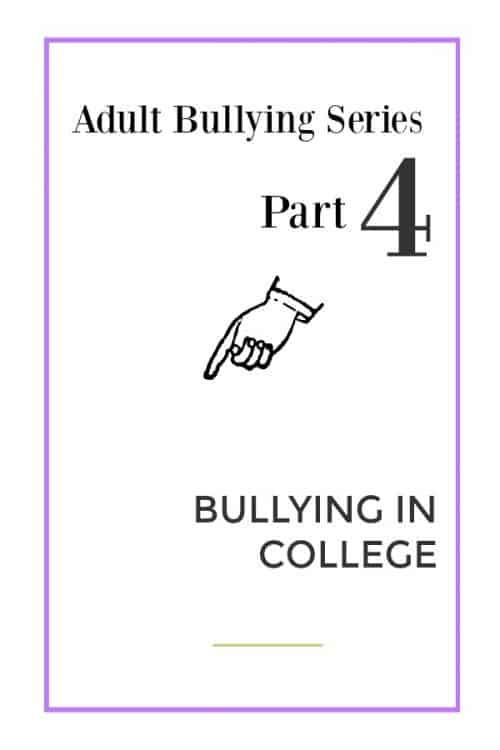Adult Bullying Part 4: Bullying in College
Sorry for the gap in my adult bullying series! Life has been really busy — in a good way — the last couple of weeks and I didn’t want to get up a post that wasn’t complete or thoroughly researched. Adult Bullying: Bullying in college is a really important topic so it doesn’t deserve anything less than my best.

It’s been a long time since I was in college, but I remember it well. It was pretty good, but I can close my eyes and be back in my Statistics 101 class and remember how kind my classmates were to each other during group projects.
Then, I can flash to my Illustration class and remember the two girls who quietly mocked the artwork of one particular young lady. The young lady was quiet, studious and focused. She had tremendous talent and we all saw it, yet we all heard the two girls make fun of her. And I’m ashamed to admit that I didn’t say anything for a few weeks, thinking that the old adage of ‘ignore it and it will stop’ would work. I didn’t want to make things worse for the young lady, and I really didn’t know what to do at all. I was 18 and naive and just out of high school.
Eventually, a few of us grew tired of it and told them to stop. The teacher either hadn’t heard it or, like us, was giving it some time. As we’ve covered before, bullying is a habitual action, not random or just a couple of times. It’s an intentional act designed to cause someone distress, and we couldn’t even tell if this girl was distressed…but it distressed us, because this girl had done nothing. She never responded, she never even looked up at them, but it was painful to watch. Once we spoke up, and the teacher addressed it (quietly), it stopped. Such a relief and that class became peaceful again.
I don’t know what happened to the young lady, I don’t remember her name, but I do hope she is still enjoying art as much as she appeared to. She had an incredible talent, and maybe that’s why those two girls treated her as they did, who knows. The good news is that often bullies get the attention but in this case, they didn’t. No one thought they were cool or funny. Maybe it was the environment, a class we’d all paid to be in or we were all art lovers, I’ll never know, but I enjoyed that class and I wish I had the fire to draw that I did back then!
My son’s in college now and he’s enjoying it. He hasn’t experienced any bullying in college, but my friend’s son has a flair for fashion and he is teased for his attire. I got a DM from someone who told me her daughter was teased for her physical disability, which astounded me because her classmates weren’t young kids fresh out of high school, but most were in their third year of school.
Because I’m no professional in this field, I sought the help of one. I got some great tips from attorney Heather Hansen, author of the book “The Elegant Warrior: How to Win Life’s Trials Without Losing Yourself.” Her excellent book (from Page Two Books) uses real-life case studies from the court room to help you triumph over your own struggles. Its 137 pages are full of tips and suggestions on how to be your own best advocate, learn to object, use your voice and more. (Heather’s PR rep sent me a complimentary copy of the book for use in this sponsored post.)
Each tip, like “Decide Whether to Get Dirty” starts with a quote, like “When they go low, we go high,” from Michelle Obama. It shares real-life examples from a trial, like the time two men made a dirty sexual innuendo to Heather. She had to decide whether to respond in a similar fashion, and call him a name or respond as rudely as he was. Instead, in today’s #MeToo society of respecting women, she chose to quietly but firmly respond that his comment was not funny and was highly inappropriate. She worried for a brief second — would he call the other attorney over and continue to make fun with his “joke?” No, he managed to pull it together, acknowledged it was wrong and stopped. Her summary quote for this example was George Bernard Shaw’s “I learned long ago never to wrestle with a pig. You both get dirty and the pig likes it,” followed by “beware of the strength of anger and use it wisely.” Words we can all live by in any situation.
This book isn’t just for women though, it will help everyone dealing with humans out in the world. She also has help for college students that she shared with me:
As college students head out to their new lives without their parents, they will face new challenges. Some of those are hard, especially in the time of MeToo, frat hazing and social media bullying. Here are some ways they can advocate for themselves in tough situations, using the word DORM as guidance.
D-Discover. First, discover yourself. You can’t advocate for yourself until you know what you want and what you don’t want. Also this is the time to learn your limits with respect to drinking, relationships, and social media.
O-Object. You have to learn to object when you don’t like something. I was petrified the first time I objected in the courtroom. But no one can set your boundaries but you. When you know what you don’t want, it is time to use your voice and set those boundaries. Objections take practice so start small. Don’t be afraid to say “ I don’t like that”
R-Recognize tone and body language College kids need to know that bodies and voices can tell them as much as words do. Tone of voice is especially helpful, as studies show you can tell more about a person’s emotion from their tone of voice than their facial expressions. If they can read tone of voice, they may hear danger before they see it.
M-Move. When you feel uncomfortable, read a weird tone in a voice, don’t like someone’s body language, or don’t like the response to your objection, you can leave. Don’t be afraid to move your body. Sometimes confidence follows.
Bullying in college may never go away, but we can help our children learn how to respond. We can’t be there to supervise anymore, and they’re young adults. While some don’t act like it, they also aren’t being supervised so who knows what reinforcements they’re receiving at home…or there may be no support. Like many adult bullies, they may be unhappy or have an endgame in mind. College is a transitional area and the stresses are high, and some people react to that badly. Let’s help give our children the tools they need to ensure their focus is on their classwork and not what someone else is doing.
And what about if their bully is a teacher/professor? It sounds crazy, but it happens. Teachers are humans, too. Some bullying in college is focused more on cyberbullying, which studies are showing is on the rise. I’ll cover cyberbullying of adults (of all ages) in my next post, but it’s really common among college students due to the heavy use of social media, including apps that allow the users to be anonymous. More on that later.
Talk with your kids. Let them know they have a support system. Just because they’re an adult now doesn’t mean they shouldn’t seek help. Remind them that they can always talk to you, that they can and should tell you if they’re facing abuse, harassment, stalking (online or off) or bullying of any type. Schools can help if the case is severe enough or detrimental to your child’s safety or mental health. In a world with growing numbers of depression and suicide, don’t let it go and assume it will go away. Let your child know that it’s not a failure to not handle this on their own; instead, asking for help is a good thing.
If you see your child less excited in going to college, withdrawing from social events, losing weight, not eating, or experiencing any change in behavior, inquire. Ask the tough questions, and if they are being bullied, don’t make them feel like they’re handling it inappropriately. Experiencing it firsthand is way different than seeing it from a distance, and if you express doubt, they are less likely to come to you next time.
What action(s) can you take? Listen. Remember details. Be supportive and take it seriously. Help them get away from a bad situation, if necessary. Not all bullying situations require that, but living in a dorm room with a bully is a recipe for disaster. Help them to keep records; document patterns, names, and teach them to use their phone as a tool in their favor. Photos and videos are incredibly helpful if you need proof. (Be sure to check legalities in your city/state.)
Know your rights at college. Talk to your residency staff, your professor, the student office, and more. You have rights and many bullying actions can actually be crimes.
For an excellent resource, visit StopBullying.gov.
Bullying in college may never go away, but we can work together. Prep our kids. Speak up. Life’s too short to let our kids deal with these situations before they’re ready AND while they’re building their future.
Thanks for reading, and stay tuned for next week’s post on adult bullying: cyberbullying. If you haven’t been reading the series, you can start here!






